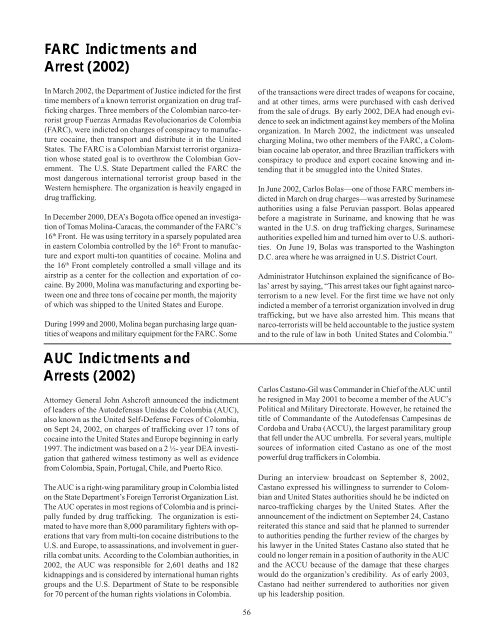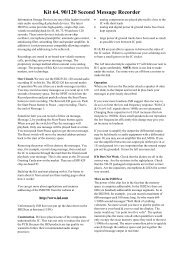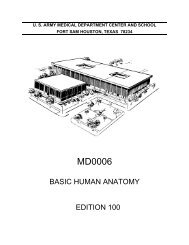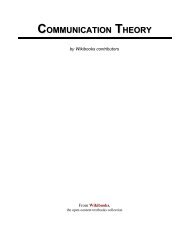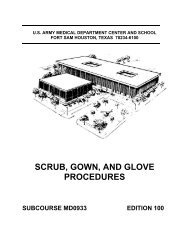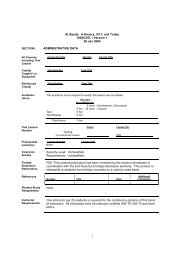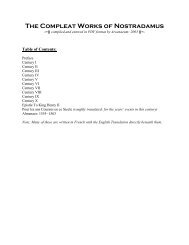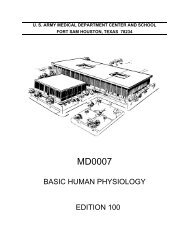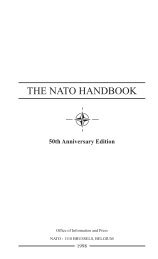Download This File - The Free Information Society
Download This File - The Free Information Society
Download This File - The Free Information Society
You also want an ePaper? Increase the reach of your titles
YUMPU automatically turns print PDFs into web optimized ePapers that Google loves.
FARC Indictments and<br />
Arrest (2002)<br />
In March 2002, the Department of Justice indicted for the first<br />
time members of a known terrorist organization on drug trafficking<br />
charges. Three members of the Colombian narco-terrorist<br />
group Fuerzas Armadas Revolucionarios de Colombia<br />
(FARC), were indicted on charges of conspiracy to manufacture<br />
cocaine, then transport and distribute it in the United<br />
States. <strong>The</strong> FARC is a Colombian Marxist terrorist organization<br />
whose stated goal is to overthrow the Colombian Government.<br />
<strong>The</strong> U.S. State Department called the FARC the<br />
most dangerous international terrorist group based in the<br />
Western hemisphere. <strong>The</strong> organization is heavily engaged in<br />
drug trafficking.<br />
In December 2000, DEA’s Bogota office opened an investigation<br />
of Tomas Molina-Caracas, the commander of the FARC’s<br />
16 th Front. He was using territory in a sparsely populated area<br />
in eastern Colombia controlled by the 16 th Front to manufacture<br />
and export multi-ton quantities of cocaine. Molina and<br />
the 16 th Front completely controlled a small village and its<br />
airstrip as a center for the collection and exportation of cocaine.<br />
By 2000, Molina was manufacturing and exporting between<br />
one and three tons of cocaine per month, the majority<br />
of which was shipped to the United States and Europe.<br />
During 1999 and 2000, Molina began purchasing large quantities<br />
of weapons and military equipment for the FARC. Some<br />
AUC Indictments and<br />
Arrests (2002)<br />
Attorney General John Ashcroft announced the indictment<br />
of leaders of the Autodefensas Unidas de Colombia (AUC),<br />
also known as the United Self-Defense Forces of Colombia,<br />
on Sept 24, 2002, on charges of trafficking over 17 tons of<br />
cocaine into the United States and Europe beginning in early<br />
1997. <strong>The</strong> indictment was based on a 2 ½- year DEA investigation<br />
that gathered witness testimony as well as evidence<br />
from Colombia, Spain, Portugal, Chile, and Puerto Rico.<br />
<strong>The</strong> AUC is a right-wing paramilitary group in Colombia listed<br />
on the State Department’s Foreign Terrorist Organization List.<br />
<strong>The</strong> AUC operates in most regions of Colombia and is principally<br />
funded by drug trafficking. <strong>The</strong> organization is estimated<br />
to have more than 8,000 paramilitary fighters with operations<br />
that vary from multi-ton cocaine distributions to the<br />
U.S. and Europe, to assassinations, and involvement in guerrilla<br />
combat units. According to the Colombian authorities, in<br />
2002, the AUC was responsible for 2,601 deaths and 182<br />
kidnappings and is considered by international human rights<br />
groups and the U.S. Department of State to be responsible<br />
for 70 percent of the human rights violations in Colombia.<br />
56<br />
of the transactions were direct trades of weapons for cocaine,<br />
and at other times, arms were purchased with cash derived<br />
from the sale of drugs. By early 2002, DEA had enough evidence<br />
to seek an indictment against key members of the Molina<br />
organization. In March 2002, the indictment was unsealed<br />
charging Molina, two other members of the FARC, a Colombian<br />
cocaine lab operator, and three Brazilian traffickers with<br />
conspiracy to produce and export cocaine knowing and intending<br />
that it be smuggled into the United States.<br />
In June 2002, Carlos Bolas—one of those FARC members indicted<br />
in March on drug charges—was arrested by Surinamese<br />
authorities using a false Peruvian passport. Bolas appeared<br />
before a magistrate in Suriname, and knowing that he was<br />
wanted in the U.S. on drug trafficking charges, Surinamese<br />
authorities expelled him and turned him over to U.S. authorities.<br />
On June 19, Bolas was transported to the Washington<br />
D.C. area where he was arraigned in U.S. District Court.<br />
Administrator Hutchinson explained the significance of Bolas’<br />
arrest by saying, “<strong>This</strong> arrest takes our fight against narcoterrorism<br />
to a new level. For the first time we have not only<br />
indicted a member of a terrorist organization involved in drug<br />
trafficking, but we have also arrested him. <strong>This</strong> means that<br />
narco-terrorists will be held accountable to the justice system<br />
and to the rule of law in both United States and Colombia.”<br />
Carlos Castano-Gil was Commander in Chief of the AUC until<br />
he resigned in May 2001 to become a member of the AUC’s<br />
Political and Military Directorate. However, he retained the<br />
title of Commandante of the Autodefensas Campesinas de<br />
Cordoba and Uraba (ACCU), the largest paramilitary group<br />
that fell under the AUC umbrella. For several years, multiple<br />
sources of information cited Castano as one of the most<br />
powerful drug traffickers in Colombia.<br />
During an interview broadcast on September 8, 2002,<br />
Castano expressed his willingness to surrender to Colombian<br />
and United States authorities should he be indicted on<br />
narco-trafficking charges by the United States. After the<br />
announcement of the indictment on September 24, Castano<br />
reiterated this stance and said that he planned to surrender<br />
to authorities pending the further review of the charges by<br />
his lawyer in the United States Castano also stated that he<br />
could no longer remain in a position of authority in the AUC<br />
and the ACCU because of the damage that these charges<br />
would do the organization’s credibility. As of early 2003,<br />
Castano had neither surrendered to authorities nor given<br />
up his leadership position.


